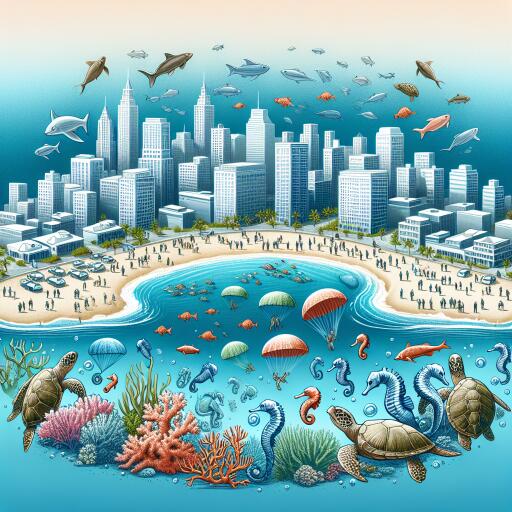
Xiamen Praised for Its Leadership in Marine Preservation Efforts
Xiamen, a city known for its breathtaking coastal beauty in Fujian province, has received international acclaim for its groundbreaking achievements in marine and ecological preservation. The city has emerged as a beacon of hope, demonstrating the profound impacts of concerted efforts in reversing the detrimental effects of urban development on marine ecosystems.
During a recent visit to Yundang Lake, once a thriving yet later deteriorated natural harbor, delegates from around the globe were able to witness firsthand the transformative restoration initiatives undertaken by the local authorities. The lake’s revival is a testament to the tireless endeavors to safeguard and enhance biodiversity in the region.
Officials remarked on the stark contrast between the lake’s past state and its current rejuvenated condition. “China’s diligent efforts in ecosystem restoration are a shining example of what can be achieved with perseverance and collective action,” noted a member of the International Union for Conservation of Nature. This positive change underscores the potential for China’s model of environmental restoration to inspire and catalyze global marine conservation efforts.
The journey of Yundang Lake’s restoration, initiated in 1988 due to alarming levels of pollution and ecological decline, showcases a broad spectrum of remedial actions. These ranged from industrial realignment and pollution control to infrastructural remodeling and seawater reintroduction, collectively breathing new life into the lake over four decades. Such measures highlight the critical role of governance, community support, and sustainable urban planning in environmental conservation.
Representatives from various nations and international organizations, convening in Xiamen to celebrate World Oceans Day, underscored the necessity of worldwide collaboration to tackle pressing marine challenges. Notably, initiatives like the collaboration between the Hellenic Center for Marine Research and the Third Institute of Oceanography of China’s Ministry of Natural Resources emphasize the importance of sharing knowledge and resources. Through such partnerships, efforts to conserve underwater heritage, enhance biological resource usage, and counter marine hazards are being strengthened.
However, the path to marine conservation is fraught with challenges, including pollution and climate change, which threaten marine life and ecosystems. The alarming rise in marine plastic waste and the environmental impact of maritime industries necessitate a paradigm shift towards a sustainable ocean economy. “Emphasizing sustainability is imperative for the survival of our oceans,” stated the Norwegian consul general, reflecting on the critical balance between marine health and economic prosperity.
In a visit to Xiamen University, discussions on sustainable ocean management illustrated the collaborative spirit between nations like China and Norway. These discussions aim at forging comprehensive policies that integrate considerations for waste management and maritime activities to promote a greener, more sustainable interaction with our oceans.
Moreover, the United Nations Development Programme highlighted the global significance of a blue economy, which presently contributes to 7 percent of the worldwide GDP. The emphasis was put on the need for global cooperation and sustainable development as vital components in preserving the world’s oceans without compromising economic growth.
“Nature recognizes no boundaries,” a sentiment echoed by all participants, emphasizing the imperative for integrated efforts to safeguard marine environments. This vision for a cohesive and sustainable management of ocean resources is not just a responsibility but a shared commitment to the future of our planet.





Leave a Reply